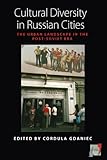Cultural Diversity in Russian Cities : The Urban Landscape in the post-Soviet Era / ed. by Cordula Gdaniec.
Material type: TextSeries: Space and Place ; 2Publisher: New York ; Oxford : Berghahn Books, [2010]Copyright date: ©2010Description: 1 online resource (196 p.)Content type:
TextSeries: Space and Place ; 2Publisher: New York ; Oxford : Berghahn Books, [2010]Copyright date: ©2010Description: 1 online resource (196 p.)Content type: - 9780857458131
- 9781845458317
- Cultural pluralism -- Russia (Federation) -- History
- Imperialism -- Social aspects -- Russia (Federation) -- History
- Language and culture -- Russia (Federation)
- Rationalization (Psychology) -- Political aspects -- Russia (Federation) -- History
- SOCIAL SCIENCE / Anthropology / General
- Urban Studies, Cultural Studies (General)
- 304.800947
- online - DeGruyter
| Item type | Current library | Call number | URL | Status | Notes | Barcode | |
|---|---|---|---|---|---|---|---|
 eBook
eBook
|
Biblioteca "Angelicum" Pont. Univ. S.Tommaso d'Aquino Nuvola online | online - DeGruyter (Browse shelf(Opens below)) | Online access | Not for loan (Accesso limitato) | Accesso per gli utenti autorizzati / Access for authorized users | (dgr)9781845458317 |
Frontmatter -- CONTENTS -- Figures -- Preface -- Chapter 1. Cultural Diversity between Staging and the Everyday -- Chapter 2. Is Chinese Space ‘Chinese?’ -- Chapter 3. Constructions of the ‘Other’ -- Chapter 4. Reshaping Living Space Concepts of Home Represented by Women Migrants Working in St. Petersburg -- Chapter 5. African Communities in Moscow and St. Petersburg -- Chapter 6. The Construction of ‘Marginality’ and ‘Normality’ -- Chapter 7. ‘You Know What Kind of Place Th is Is, Don’t You?’ -- Chapter 8. Begging as Economic Practice -- Notes on Contributors -- Index
restricted access online access with authorization star
http://purl.org/coar/access_right/c_16ec
Cultural diversity — the multitude of different lifestyles that are not necessarily based on ethnic culture — is a catchphrase increasingly used in place of multiculturalism and in conjunction with globalization. Even though it is often used as a slogan it does capture a widespread phenomenon that cities must contend with in dealing with their increasingly diverse populations. The contributors examine how Russian cities are responding and through case studies from Moscow, St. Petersburg, Novosibirsk, and Sochi explore the ways in which different cultures are inscribed into urban spaces, when and where they are present in public space, and where and how they carve out their private spaces. Through its unique exploration of the Russian example, this volume addresses the implications of the fragmented urban landscape on cultural practices and discourses, ethnicity, lifestyles and subcultures, and economic practices, and in doing so provides important insights applicable to a global context.
Mode of access: Internet via World Wide Web.
In English.
Description based on online resource; title from PDF title page (publisher's Web site, viewed 25. Jun 2024)


